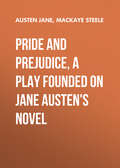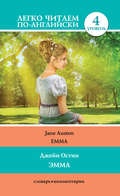
Джейн Остин
Mansfield Park
CHAPTER XXIV
Henry Crawford had quite made up his mind by the next morning to give another fortnight to Mansfield, and having sent for his hunters, and written a few lines of explanation to the Admiral, he looked round at his sister as he sealed and threw the letter from him, and seeing the coast clear of the rest of the family, said, with a smile, “And how do you think I mean to amuse myself, Mary, on the days that I do not hunt? I am grown too old to go out more than three times a week; but I have a plan for the intermediate days, and what do you think it is?”
“To walk and ride with me, to be sure.”
“Not exactly, though I shall be happy to do both, but that would be exercise only to my body, and I must take care of my mind. Besides, that would be all recreation and indulgence, without the wholesome alloy of labour, and I do not like to eat the bread of idleness. No, my plan is to make Fanny Price in love with me.”
“Fanny Price! Nonsense! No, no. You ought to be satisfied with her two cousins.”
“But I cannot be satisfied without Fanny Price, without making a small hole in Fanny Price’s heart. You do not seem properly aware of her claims to notice. When we talked of her last night, you none of you seemed sensible of the wonderful improvement that has taken place in her looks within the last six weeks. You see her every day, and therefore do not notice it; but I assure you she is quite a different creature from what she was in the autumn. She was then merely a quiet, modest, not plain-looking girl, but she is now absolutely pretty. I used to think she had neither complexion nor countenance; but in that soft skin of hers, so frequently tinged with a blush as it was yesterday, there is decided beauty; and from what I observed of her eyes and mouth, I do not despair of their being capable of expression enough when she has anything to express. And then, her air, her manner, her tout ensemble, is so indescribably improved! She must be grown two inches, at least, since October.”
“Phoo! phoo! This is only because there were no tall women to compare her with, and because she has got a new gown, and you never saw her so well dressed before. She is just what she was in October, believe me. The truth is, that she was the only girl in company for you to notice, and you must have a somebody. I have always thought her pretty – not strikingly pretty – but ‘pretty enough,’ as people say; a sort of beauty that grows on one. Her eyes should be darker, but she has a sweet smile; but as for this wonderful degree of improvement, I am sure it may all be resolved into a better style of dress, and your having nobody else to look at; and therefore, if you do set about a flirtation with her, you never will persuade me that it is in compliment to her beauty, or that it proceeds from anything but your own idleness and folly.”
Her brother gave only a smile to this accusation, and soon afterwards said, “I do not quite know what to make of Miss Fanny. I do not understand her. I could not tell what she would be at yesterday. What is her character? Is she solemn? Is she queer? Is she prudish? Why did she draw back and look so grave at me? I could hardly get her to speak. I never was so long in company with a girl in my life, trying to entertain her, and succeed so ill! Never met with a girl who looked so grave on me! I must try to get the better of this. Her looks say, ‘I will not like you, I am determined not to like you’; and I say she shall.”
“Foolish fellow! And so this is her attraction after all! This it is, her not caring about you, which gives her such a soft skin, and makes her so much taller, and produces all these charms and graces! I do desire that you will not be making her really unhappy; a little love, perhaps, may animate and do her good, but I will not have you plunge her deep, for she is as good a little creature as ever lived, and has a great deal of feeling.”
“It can be but for a fortnight,” said Henry; “and if a fortnight can kill her, she must have a constitution which nothing could save. No, I will not do her any harm, dear little soul! only want her to look kindly on me, to give me smiles as well as blushes, to keep a chair for me by herself wherever we are, and be all animation when I take it and talk to her; to think as I think, be interested in all my possessions and pleasures, try to keep me longer at Mansfield, and feel when I go away that she shall be never happy again. I want nothing more.”
“Moderation itself!” said Mary. “I can have no scruples now. Well, you will have opportunities enough of endeavouring to recommend yourself, for we are a great deal together.”
And without attempting any farther remonstrance, she left Fanny to her fate, a fate which, had not Fanny’s heart been guarded in a way unsuspected by Miss Crawford, might have been a little harder than she deserved; for although there doubtless are such unconquerable young ladies of eighteen (or one should not read about them) as are never to be persuaded into love against their judgment by all that talent, manner, attention, and flattery can do, I have no inclination to believe Fanny one of them, or to think that with so much tenderness of disposition, and so much taste as belonged to her, she could have escaped heart-whole from the courtship (though the courtship only of a fortnight) of such a man as Crawford, in spite of there being some previous ill opinion of him to be overcome, had not her affection been engaged elsewhere. With all the security which love of another and disesteem of him could give to the peace of mind he was attacking, his continued attentions – continued, but not obtrusive, and adapting themselves more and more to the gentleness and delicacy of her character – obliged her very soon to dislike him less than formerly. She had by no means forgotten the past, and she thought as ill of him as ever; but she felt his powers: he was entertaining; and his manners were so improved, so polite, so seriously and blamelessly polite, that it was impossible not to be civil to him in return.
A very few days were enough to effect this; and at the end of those few days, circumstances arose which had a tendency rather to forward his views of pleasing her, inasmuch as they gave her a degree of happiness which must dispose her to be pleased with everybody. William, her brother, the so long absent and dearly loved brother, was in England again. She had a letter from him herself, a few hurried happy lines, written as the ship came up Channel, and sent into Portsmouth with the first boat that left the Antwerp at anchor in Spithead; and when Crawford walked up with the newspaper in his hand, which he had hoped would bring the first tidings, he found her trembling with joy over this letter, and listening with a glowing, grateful countenance to the kind invitation which her uncle was most collectedly dictating in reply.
It was but the day before that Crawford had made himself thoroughly master of the subject, or had in fact become at all aware of her having such a brother, or his being in such a ship, but the interest then excited had been very properly lively, determining him on his return to town to apply for information as to the probable period of the Antwerp’s return from the Mediterranean, etc.; and the good luck which attended his early examination of ship news the next morning seemed the reward of his ingenuity in finding out such a method of pleasing her, as well as of his dutiful attention to the Admiral, in having for many years taken in the paper esteemed to have the earliest naval intelligence. He proved, however, to be too late. All those fine first feelings, of which he had hoped to be the exciter, were already given. But his intention, the kindness of his intention, was thankfully acknowledged: quite thankfully and warmly, for she was elevated beyond the common timidity of her mind by the flow of her love for William.
This dear William would soon be amongst them. There could be no doubt of his obtaining leave of absence immediately, for he was still only a midshipman; and as his parents, from living on the spot, must already have seen him, and be seeing him perhaps daily, his direct holidays might with justice be instantly given to the sister, who had been his best correspondent through a period of seven years, and the uncle who had done most for his support and advancement; and accordingly the reply to her reply, fixing a very early day for his arrival, came as soon as possible; and scarcely ten days had passed since Fanny had been in the agitation of her first dinner-visit, when she found herself in an agitation of a higher nature, watching in the hall, in the lobby, on the stairs, for the first sound of the carriage which was to bring her a brother.
It came happily while she was thus waiting; and there being neither ceremony nor fearfulness to delay the moment of meeting, she was with him as he entered the house, and the first minutes of exquisite feeling had no interruption and no witnesses, unless the servants chiefly intent upon opening the proper doors could be called such. This was exactly what Sir Thomas and Edmund had been separately conniving at, as each proved to the other by the sympathetic alacrity with which they both advised Mrs. Norris’s continuing where she was, instead of rushing out into the hall as soon as the noises of the arrival reached them.
William and Fanny soon shewed themselves; and Sir Thomas had the pleasure of receiving, in his protege, certainly a very different person from the one he had equipped seven years ago, but a young man of an open, pleasant countenance, and frank, unstudied, but feeling and respectful manners, and such as confirmed him his friend.
It was long before Fanny could recover from the agitating happiness of such an hour as was formed by the last thirty minutes of expectation, and the first of fruition; it was some time even before her happiness could be said to make her happy, before the disappointment inseparable from the alteration of person had vanished, and she could see in him the same William as before, and talk to him, as her heart had been yearning to do through many a past year. That time, however, did gradually come, forwarded by an affection on his side as warm as her own, and much less encumbered by refinement or self-distrust. She was the first object of his love, but it was a love which his stronger spirits, and bolder temper, made it as natural for him to express as to feel. On the morrow they were walking about together with true enjoyment, and every succeeding morrow renewed a tete-a-tete which Sir Thomas could not but observe with complacency, even before Edmund had pointed it out to him.
Excepting the moments of peculiar delight, which any marked or unlooked-for instance of Edmund’s consideration of her in the last few months had excited, Fanny had never known so much felicity in her life, as in this unchecked, equal, fearless intercourse with the brother and friend who was opening all his heart to her, telling her all his hopes and fears, plans, and solicitudes respecting that long thought of, dearly earned, and justly valued blessing of promotion; who could give her direct and minute information of the father and mother, brothers and sisters, of whom she very seldom heard; who was interested in all the comforts and all the little hardships of her home at Mansfield; ready to think of every member of that home as she directed, or differing only by a less scrupulous opinion, and more noisy abuse of their aunt Norris, and with whom (perhaps the dearest indulgence of the whole) all the evil and good of their earliest years could be gone over again, and every former united pain and pleasure retraced with the fondest recollection. An advantage this, a strengthener of love, in which even the conjugal tie is beneath the fraternal. Children of the same family, the same blood, with the same first associations and habits, have some means of enjoyment in their power, which no subsequent connexions can supply; and it must be by a long and unnatural estrangement, by a divorce which no subsequent connexion can justify, if such precious remains of the earliest attachments are ever entirely outlived. Too often, alas! it is so. Fraternal love, sometimes almost everything, is at others worse than nothing. But with William and Fanny Price it was still a sentiment in all its prime and freshness, wounded by no opposition of interest, cooled by no separate attachment, and feeling the influence of time and absence only in its increase.
An affection so amiable was advancing each in the opinion of all who had hearts to value anything good. Henry Crawford was as much struck with it as any. He honoured the warm-hearted, blunt fondness of the young sailor, which led him to say, with his hands stretched towards Fanny’s head, “Do you know, I begin to like that queer fashion already, though when I first heard of such things being done in England, I could not believe it; and when Mrs. Brown, and the other women at the Commissioner’s at Gibraltar, appeared in the same trim, I thought they were mad; but Fanny can reconcile me to anything”; and saw, with lively admiration, the glow of Fanny’s cheek, the brightness of her eye, the deep interest, the absorbed attention, while her brother was describing any of the imminent hazards, or terrific scenes, which such a period at sea must supply.
It was a picture which Henry Crawford had moral taste enough to value. Fanny’s attractions increased – increased twofold; for the sensibility which beautified her complexion and illumined her countenance was an attraction in itself. He was no longer in doubt of the capabilities of her heart. She had feeling, genuine feeling. It would be something to be loved by such a girl, to excite the first ardours of her young unsophisticated mind! She interested him more than he had foreseen. A fortnight was not enough. His stay became indefinite.
William was often called on by his uncle to be the talker. His recitals were amusing in themselves to Sir Thomas, but the chief object in seeking them was to understand the reciter, to know the young man by his histories; and he listened to his clear, simple, spirited details with full satisfaction, seeing in them the proof of good principles, professional knowledge, energy, courage, and cheerfulness, everything that could deserve or promise well. Young as he was, William had already seen a great deal. He had been in the Mediterranean; in the West Indies; in the Mediterranean again; had been often taken on shore by the favour of his captain, and in the course of seven years had known every variety of danger which sea and war together could offer. With such means in his power he had a right to be listened to; and though Mrs. Norris could fidget about the room, and disturb everybody in quest of two needlefuls of thread or a second-hand shirt button, in the midst of her nephew’s account of a shipwreck or an engagement, everybody else was attentive; and even Lady Bertram could not hear of such horrors unmoved, or without sometimes lifting her eyes from her work to say, “Dear me! how disagreeable! I wonder anybody can ever go to sea.”
To Henry Crawford they gave a different feeling. He longed to have been at sea, and seen and done and suffered as much. His heart was warmed, his fancy fired, and he felt the highest respect for a lad who, before he was twenty, had gone through such bodily hardships and given such proofs of mind. The glory of heroism, of usefulness, of exertion, of endurance, made his own habits of selfish indulgence appear in shameful contrast; and he wished he had been a William Price, distinguishing himself and working his way to fortune and consequence with so much self-respect and happy ardour, instead of what he was!
The wish was rather eager than lasting. He was roused from the reverie of retrospection and regret produced by it, by some inquiry from Edmund as to his plans for the next day’s hunting; and he found it was as well to be a man of fortune at once with horses and grooms at his command. In one respect it was better, as it gave him the means of conferring a kindness where he wished to oblige. With spirits, courage, and curiosity up to anything, William expressed an inclination to hunt; and Crawford could mount him without the slightest inconvenience to himself, and with only some scruples to obviate in Sir Thomas, who knew better than his nephew the value of such a loan, and some alarms to reason away in Fanny. She feared for William; by no means convinced by all that he could relate of his own horsemanship in various countries, of the scrambling parties in which he had been engaged, the rough horses and mules he had ridden, or his many narrow escapes from dreadful falls, that he was at all equal to the management of a high-fed hunter in an English fox-chase; nor till he returned safe and well, without accident or discredit, could she be reconciled to the risk, or feel any of that obligation to Mr. Crawford for lending the horse which he had fully intended it should produce. When it was proved, however, to have done William no harm, she could allow it to be a kindness, and even reward the owner with a smile when the animal was one minute tendered to his use again; and the next, with the greatest cordiality, and in a manner not to be resisted, made over to his use entirely so long as he remained in Northamptonshire.
CHAPTER XXV
The intercourse of the two families was at this period more nearly restored to what it had been in the autumn, than any member of the old intimacy had thought ever likely to be again. The return of Henry Crawford, and the arrival of William Price, had much to do with it, but much was still owing to Sir Thomas’s more than toleration of the neighbourly attempts at the Parsonage. His mind, now disengaged from the cares which had pressed on him at first, was at leisure to find the Grants and their young inmates really worth visiting; and though infinitely above scheming or contriving for any the most advantageous matrimonial establishment that could be among the apparent possibilities of any one most dear to him, and disdaining even as a littleness the being quick-sighted on such points, he could not avoid perceiving, in a grand and careless way, that Mr. Crawford was somewhat distinguishing his niece – nor perhaps refrain (though unconsciously) from giving a more willing assent to invitations on that account.
His readiness, however, in agreeing to dine at the Parsonage, when the general invitation was at last hazarded, after many debates and many doubts as to whether it were worth while, “because Sir Thomas seemed so ill inclined, and Lady Bertram was so indolent!” proceeded from good-breeding and goodwill alone, and had nothing to do with Mr. Crawford, but as being one in an agreeable group: for it was in the course of that very visit that he first began to think that any one in the habit of such idle observations would have thought that Mr. Crawford was the admirer of Fanny Price.
The meeting was generally felt to be a pleasant one, being composed in a good proportion of those who would talk and those who would listen; and the dinner itself was elegant and plentiful, according to the usual style of the Grants, and too much according to the usual habits of all to raise any emotion except in Mrs. Norris, who could never behold either the wide table or the number of dishes on it with patience, and who did always contrive to experience some evil from the passing of the servants behind her chair, and to bring away some fresh conviction of its being impossible among so many dishes but that some must be cold.
In the evening it was found, according to the predetermination of Mrs. Grant and her sister, that after making up the whist-table there would remain sufficient for a round game, and everybody being as perfectly complying and without a choice as on such occasions they always are, speculation was decided on almost as soon as whist; and Lady Bertram soon found herself in the critical situation of being applied to for her own choice between the games, and being required either to draw a card for whist or not. She hesitated. Luckily Sir Thomas was at hand.
“What shall I do, Sir Thomas? Whist and speculation; which will amuse me most?”
Sir Thomas, after a moment’s thought, recommended speculation. He was a whist player himself, and perhaps might feel that it would not much amuse him to have her for a partner.
“Very well,” was her ladyship’s contented answer; “then speculation, if you please, Mrs. Grant. I know nothing about it, but Fanny must teach me.”
Here Fanny interposed, however, with anxious protestations of her own equal ignorance; she had never played the game nor seen it played in her life; and Lady Bertram felt a moment’s indecision again; but upon everybody’s assuring her that nothing could be so easy, that it was the easiest game on the cards, and Henry Crawford’s stepping forward with a most earnest request to be allowed to sit between her ladyship and Miss Price, and teach them both, it was so settled; and Sir Thomas, Mrs. Norris, and Dr. and Mrs. Grant being seated at the table of prime intellectual state and dignity, the remaining six, under Miss Crawford’s direction, were arranged round the other. It was a fine arrangement for Henry Crawford, who was close to Fanny, and with his hands full of business, having two persons’ cards to manage as well as his own; for though it was impossible for Fanny not to feel herself mistress of the rules of the game in three minutes, he had yet to inspirit her play, sharpen her avarice, and harden her heart, which, especially in any competition with William, was a work of some difficulty; and as for Lady Bertram, he must continue in charge of all her fame and fortune through the whole evening; and if quick enough to keep her from looking at her cards when the deal began, must direct her in whatever was to be done with them to the end of it.
He was in high spirits, doing everything with happy ease, and preeminent in all the lively turns, quick resources, and playful impudence that could do honour to the game; and the round table was altogether a very comfortable contrast to the steady sobriety and orderly silence of the other.
Twice had Sir Thomas inquired into the enjoyment and success of his lady, but in vain; no pause was long enough for the time his measured manner needed; and very little of her state could be known till Mrs. Grant was able, at the end of the first rubber, to go to her and pay her compliments.
“I hope your ladyship is pleased with the game.”
“Oh dear, yes! very entertaining indeed. A very odd game. I do not know what it is all about. I am never to see my cards; and Mr. Crawford does all the rest.”
“Bertram,” said Crawford, some time afterwards, taking the opportunity of a little languor in the game, “I have never told you what happened to me yesterday in my ride home.” They had been hunting together, and were in the midst of a good run, and at some distance from Mansfield, when his horse being found to have flung a shoe, Henry Crawford had been obliged to give up, and make the best of his way back. “I told you I lost my way after passing that old farmhouse with the yew-trees, because I can never bear to ask; but I have not told you that, with my usual luck – for I never do wrong without gaining by it – I found myself in due time in the very place which I had a curiosity to see. I was suddenly, upon turning the corner of a steepish downy field, in the midst of a retired little village between gently rising hills; a small stream before me to be forded, a church standing on a sort of knoll to my right – which church was strikingly large and handsome for the place, and not a gentleman or half a gentleman’s house to be seen excepting one – to be presumed the Parsonage – within a stone’s throw of the said knoll and church. I found myself, in short, in Thornton Lacey.”
“It sounds like it,” said Edmund; “but which way did you turn after passing Sewell’s farm?”
“I answer no such irrelevant and insidious questions; though were I to answer all that you could put in the course of an hour, you would never be able to prove that it was not Thornton Lacey – for such it certainly was.”
“You inquired, then?”
“No, I never inquire. But I told a man mending a hedge that it was Thornton Lacey, and he agreed to it.”
“You have a good memory. I had forgotten having ever told you half so much of the place.”
Thornton Lacey was the name of his impending living, as Miss Crawford well knew; and her interest in a negotiation for William Price’s knave increased.
“Well,” continued Edmund, “and how did you like what you saw?”
“Very much indeed. You are a lucky fellow. There will be work for five summers at least before the place is liveable.”
“No, no, not so bad as that. The farmyard must be moved, I grant you; but I am not aware of anything else. The house is by no means bad, and when the yard is removed, there may be a very tolerable approach to it.”
“The farmyard must be cleared away entirely, and planted up to shut out the blacksmith’s shop. The house must be turned to front the east instead of the north – the entrance and principal rooms, I mean, must be on that side, where the view is really very pretty; I am sure it may be done. And there must be your approach, through what is at present the garden. You must make a new garden at what is now the back of the house; which will be giving it the best aspect in the world, sloping to the south-east. The ground seems precisely formed for it. I rode fifty yards up the lane, between the church and the house, in order to look about me; and saw how it might all be. Nothing can be easier. The meadows beyond what will be the garden, as well as what now is, sweeping round from the lane I stood in to the north-east, that is, to the principal road through the village, must be all laid together, of course; very pretty meadows they are, finely sprinkled with timber. They belong to the living, I suppose; if not, you must purchase them. Then the stream – something must be done with the stream; but I could not quite determine what. I had two or three ideas.”
“And I have two or three ideas also,” said Edmund, “and one of them is, that very little of your plan for Thornton Lacey will ever be put in practice. I must be satisfied with rather less ornament and beauty. I think the house and premises may be made comfortable, and given the air of a gentleman’s residence, without any very heavy expense, and that must suffice me; and, I hope, may suffice all who care about me.”
Miss Crawford, a little suspicious and resentful of a certain tone of voice, and a certain half-look attending the last expression of his hope, made a hasty finish of her dealings with William Price; and securing his knave at an exorbitant rate, exclaimed, “There, I will stake my last like a woman of spirit. No cold prudence for me. I am not born to sit still and do nothing. If I lose the game, it shall not be from not striving for it.”
The game was hers, and only did not pay her for what she had given to secure it. Another deal proceeded, and Crawford began again about Thornton Lacey.
“My plan may not be the best possible: I had not many minutes to form it in; but you must do a good deal. The place deserves it, and you will find yourself not satisfied with much less than it is capable of. (Excuse me, your ladyship must not see your cards. There, let them lie just before you.) The place deserves it, Bertram. You talk of giving it the air of a gentleman’s residence. That will be done by the removal of the farmyard; for, independent of that terrible nuisance, I never saw a house of the kind which had in itself so much the air of a gentleman’s residence, so much the look of a something above a mere parsonage-house – above the expenditure of a few hundreds a year. It is not a scrambling collection of low single rooms, with as many roofs as windows; it is not cramped into the vulgar compactness of a square farmhouse: it is a solid, roomy, mansion-like looking house, such as one might suppose a respectable old country family had lived in from generation to generation, through two centuries at least, and were now spending from two to three thousand a year in.” Miss Crawford listened, and Edmund agreed to this. “The air of a gentleman’s residence, therefore, you cannot but give it, if you do anything. But it is capable of much more. (Let me see, Mary; Lady Bertram bids a dozen for that queen; no, no, a dozen is more than it is worth. Lady Bertram does not bid a dozen. She will have nothing to say to it. Go on, go on.) By some such improvements as I have suggested (I do not really require you to proceed upon my plan, though, by the bye, I doubt anybody’s striking out a better) you may give it a higher character. You may raise it into a place. From being the mere gentleman’s residence, it becomes, by judicious improvement, the residence of a man of education, taste, modern manners, good connexions. All this may be stamped on it; and that house receive such an air as to make its owner be set down as the great landholder of the parish by every creature travelling the road; especially as there is no real squire’s house to dispute the point – a circumstance, between ourselves, to enhance the value of such a situation in point of privilege and independence beyond all calculation. You think with me, I hope” (turning with a softened voice to Fanny). “Have you ever seen the place?”
Fanny gave a quick negative, and tried to hide her interest in the subject by an eager attention to her brother, who was driving as hard a bargain, and imposing on her as much as he could; but Crawford pursued with “No, no, you must not part with the queen. You have bought her too dearly, and your brother does not offer half her value. No, no, sir, hands off, hands off. Your sister does not part with the queen. She is quite determined. The game will be yours,” turning to her again; “it will certainly be yours.”







